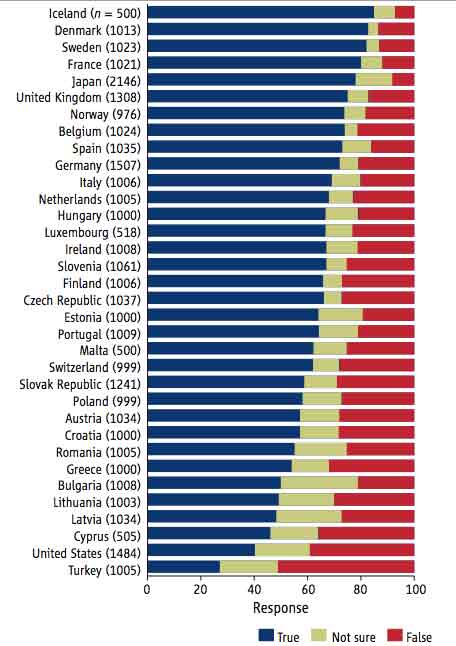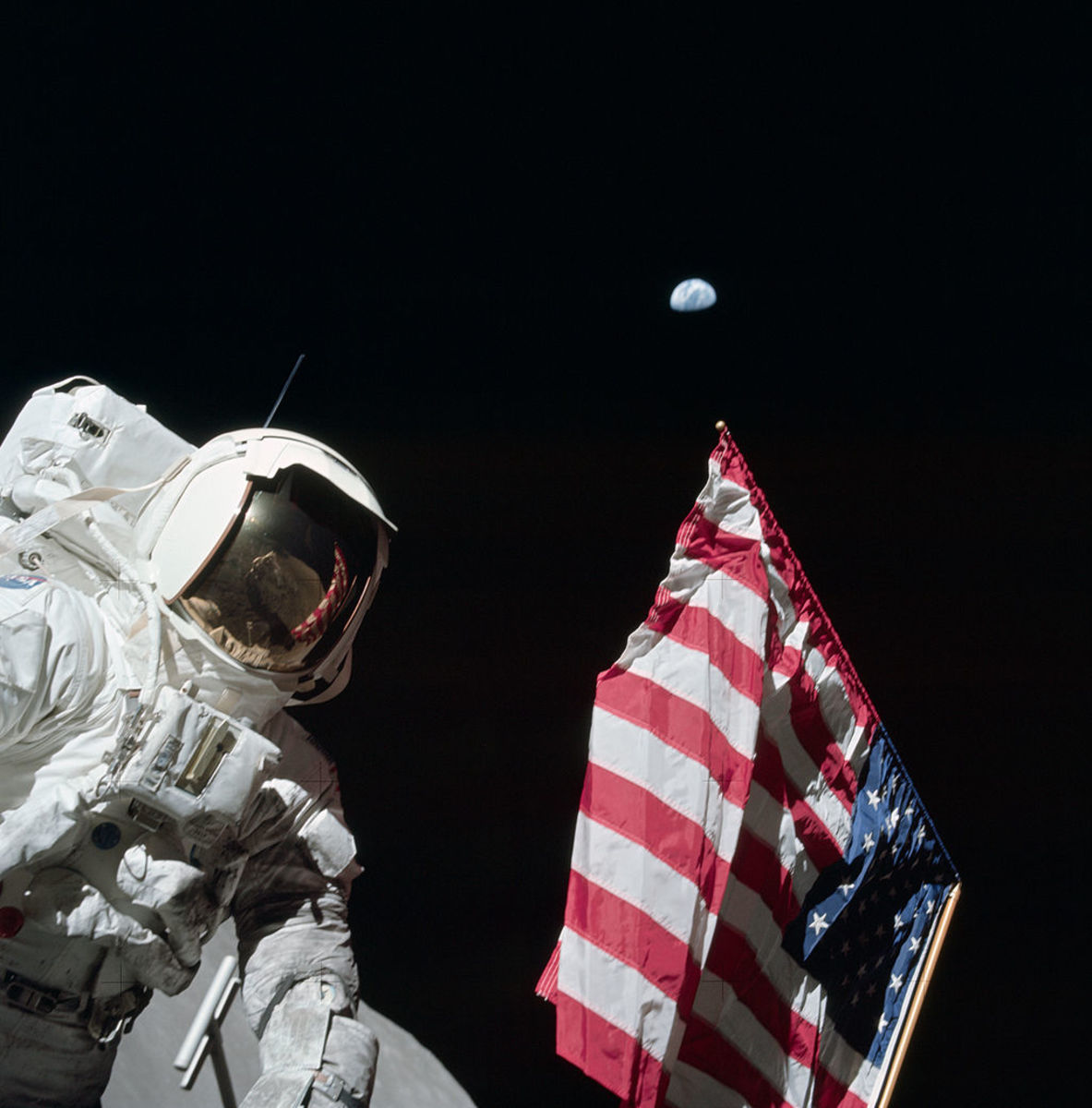Skepticism about Evolution in the United States

A Localized Phenomenon?
“Nothing in biology makes sense except in the light of evolution” - Theodosius Dobzhansky
Evolution, as testable and proven as it has been for the past few centuries, is still not accepted by all. It's quite ignorant and even insulting to think that despite the benefits we all receive from sciences that are based on evolutionary aspects, like antibiotics, selective breeding and even algorithmic programming, some individuals still think that they're fabricated lies. To what end?
It's shocking to note that this observation is more predominant in the United States. A study that compared the results of past surveys done in the United States, Japan and 32 other European countries showed that in the United States, only 14 percent of adults think that evolution is definitely true. Other European countries like France, Denmark and Sweden have over 80% of adults surveyed accepting the concept of evolution. The study is also quick to note that less than half of Americans could provide a minimal definition of DNA. The only country that ranks lower in acceptance of evolution than the United States is Turkey.
What is more disturbing is that not much has changed in the last few decades. Since 1982 phone polls by Gallup have yielded consistent results. The creationist perspective has never drawn less than 44% in all cases. That means for the past 30 years, almost half of the American population thinks that Darwin was wrong, despite all the evidence and beneficial exploitations from this theory.
American Culture and Evolution
The study managed to find three key influences on Americans that don't occur as often in Europe.
First, fundamentalist belief on opinions of evolution is significantly higher in the United States than Europe. The Protestant fundamentalism notion, where Biblical accounts of human creation are considered accurate and are taken as literal meanings, is a historical tradition in the United States and something that isn't found in Europe.
It notes that most of the Protestant churches aren't part of any hierarchy - they're free to choose their own ministers, traditions and beliefs, without any influence. Just whatever they feel is the more correct interpretation of the Bible. This freedom allowed Protestant churches to create their own Bible colleges to train more ministers, resulting in more propagation of their teachings - something that hasn't occurred nearly as often in Europe.
Second, the team found that political views had an effect on an American's view on evolutionary theory. They noted that "individuals with anti-abortion, pro-life views associated with the conservative wing of the Republican Party were significantly more likely to reject evolution than people with pro-choice views", adding that these views or political stances in Europe had no correlation to whether or not a person accepts evolution.
Third, and this might be tongue-in-cheek, but it could simply be the effect of natural selection itself. A greater understanding in genetics will help in accepting evolution. However, central ideas about evolutionary biology from the past few centuries are seriously misunderstood by the American public. The team cites a 2005 study where 78% of adults claimed that plants and animals evolved from other organisms. However, 62% of adults also believed that humans were created by God without evolutionary development.
Other Factors
The opinions of the theory of evolution are also affected by more generic factors.
Education
Education is an expected one. Without a proper education it can be hard to understand scientific concepts. People generally tend to not believe in things they don't understand. But that's just at the surface - the core of education (or what it's supposed to be) is not to teach laws, ideas or concepts. It's to teach critical thinking: the ability to interpret these laws. It shouldn't teach you what to learn, but rather how to learn. If you do not know how to think critically you're at a significant disadvantage in understanding key scientific concepts.
A recent Gallup poll has garnered some interesting results regarding acceptance of evolutionary theory. The percentage of people who accept evolution with differing levels of education are as follows:
- High school or less - 21%
- Some college - 41%
- College graduates - 53%
- Postgraduates - 74%
In other words, with more education you can expect a better acceptance rate in evolution. The same trend is observed for disbelief in evolution, only in the opposite direction:
- High school or less - 27%
- Some college - 29%
- College graduates - 22%
- Postgraduates - 11%
With more education you can expect a weaker disbelief rate in evolution.
Religion
Having "blind faith" is also something that impedes your ability to accept evolution. Why? Some suggest that belief in religion limits critical thinking. Reason and logic are suppressed if not altogether abandoned in favour of religious beliefs.
The following numbers from the same Gallup poll seem to support this view. The percentage of people who accept evolution based on church attendance are as follows:
- Weekly church attendance- 24%
- Weekly-Monthly attendance - 30 %
- Never - 55%
The more you go to church, the less likely you are to accept evolution. The inverse is true for disbelief in evolution:
- Weekly church attendance- 41%
- Weekly-Monthly attendance - 26 %
- Never - 11%
The more you go to church, the more likely you are to not believe in evolution.
Age
Surprisingly age can also predict whether or not you believe in evolution. The percentage of people who accept evolution based on age are as follows:
- 18 to 34 years old - 49%
- 35 to 54 years old - 39 %
- 55 or older - 31%
The opposite is also true for disbelief in evolution:
- 18 to 34 years old - 18%
- 35 to 54 years old - 24 %
- 55 or older - 30%
Age is more difficult to explain. It could simply be that there is a greater number of youth that have been better exposed to evolutionary concepts and are more likely to accept it. It could also be that older generations have been more exposed to religious fundamentalism in the past and are less likely to accept the theory.
Note: this does not mean that as you age you are more likely to reject evolution as a theory!
Parting Thoughts
The United States is in a unique position of equating belief with political stance. And this isn't a good thing. It reminds me of this quote by E.B. White:
"Democracy is the recurrent suspicion that more than half of the people are right more than half the time."
What bothers me though is that suspicion will be skewed even further if people are willing to discard rational thinking with blind faith and base their political views with whatever matches up to their beliefs. The country will literally be the blind leading the blind.
And it's not a pretty sight.









